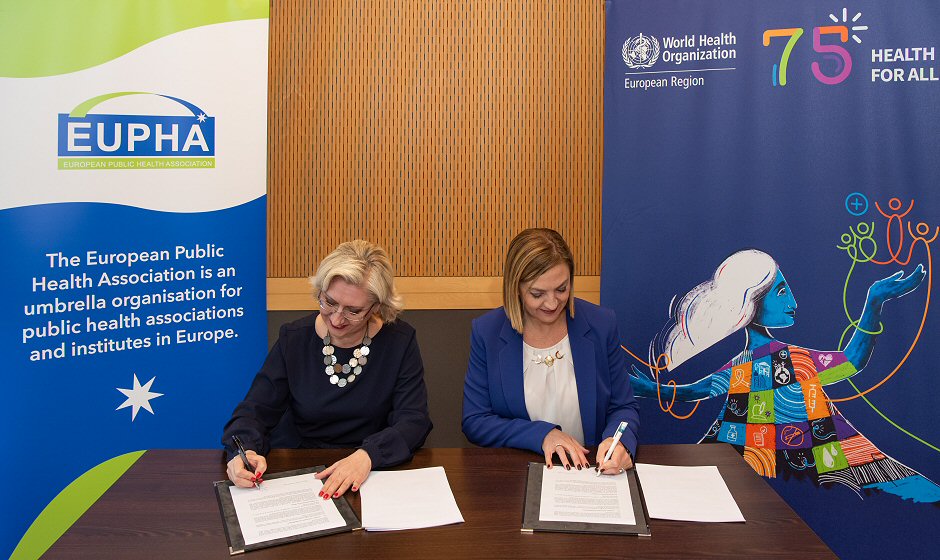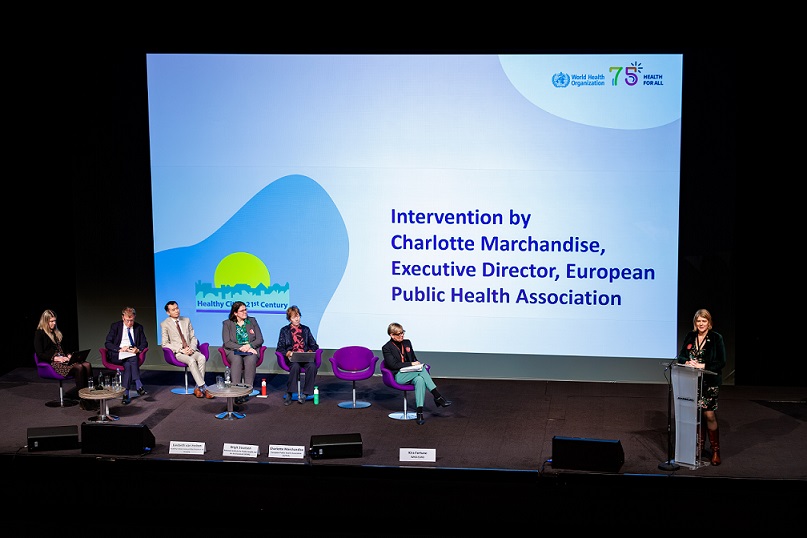 |
The European Public Health Association Newsletter - November 2023 |
1. EditorialAs the leaves change and December comes in, we are excited to bring you the latest edition of the EUPHA newsletter. This issue follows the resounding success of the EPH conference in Dublin, and we extend our heartfelt thanks to all who participated and contributed to its success. This month is pivotal as begins the COP28, the United Nations Climate Change Conference. Health Our global federation, the World Federation of Public Health Associations (WFPHA), is gearing up for active participation in this critical event. It's a moment where health professionals worldwide are amplifying their call to global leaders, advocating for decisive, joint action on climate and health issues. Enjoy the read, Iveta Nagyova, EUPHA president and Charlotte Marchandise, Executive Director |
2. EUPHA updateEUPHA and WHO Memorandum of UnderstandingThis memorandum, which was signed during the EPH Conference in Dublin, underscores the active role of urban and regional entities in shaping health policies and practices, marking a new era where cities and regions as contributors in shaping a healthier Europe, will collaborate more closely with researchers and Public Health professionals from EUPHA.
The MoU concentrates on building a robust evidence base, aiming to facilitate the integration of this evidence into policy and decision-making. It also seeks to create bridges between the local, regional, national, and international levels. The MoU supports joint advocacy, amplifying the public health voices and strengthening the public health community. Special attention will be paid to specific topics, with an action plan to be developed in collaboration with WHO Euro teams. These topics include mental health, behavioral and cultural insights, health equity, social and economic determinants of health, addressing noncommunicable diseases (NCDs) with innovative solutions, as well as strengthening a primary health care approach through the integration of the Essential Public Health Functions. We extend our profound gratitude to the WHO team for their unwavering support and collaboration in this endeavor. Fostering Collaborative Efforts with WHO Healthy Cities and Regions for Public Health AdvancementOur Executive Director participated in the WHO European Healthy Cities Annual Business Meeting, which also marked the celebration of the 35th anniversary of their network. She proudly shared the Memorandum of Understanding (MoU) signed between EUPHA and the World Health Organization during the EPH conference in Dublin. This collaboration is envisioned to empower cities and regions, enhancing their capacity to address public health challenges effectively, ensuring that valuable insights and experiences are shared and utilized across various governance levels. |
3. European Public Health Conference16th EUROPEAN PUBLIC HEALTH CONFERENCE, DUBLIN 2023 |
4. EUPHA members updateStatement by SESPAS: The state of siege in the Gaza Strip leads to a serious epidemic emergencySESPAS (Spanish Society for Public Health and Health Administration) considers that reducing the frequency and intensity of armed conflict is not only a stated goal of the 2030 Sustainable Development Goals, but a necessary cross-cutting issue for human wellbeing and progress. Conflict and violence have resulted in loss of life, but also in damage to health systems, limited access to health services and the resurgence of infectious diseases in violent conflicts. Through this lens, peace is a key structural determinant of health, an approach endorsed by the WHO in the contextual frameworks of health determinants. With this conviction, as health professionals, we denounce the injustices of wars and armed conflicts. The conflicts in Ukraine, the Democratic Republic of Congo, Webinar on Arts and humanities for good public healthThere is growing recognition of the role of the arts and humanities for good public health practice and policy. The UK Faculty of Public Health and the Centre for History in Public Health at the London School of Tropical Medicine are organising an international webinar to address the importance of arts and humanities education and training within public health training: Arts and Humanities for good public health takes place on Tuesday 30th January 2024 from 4pm to 6pm GMT; 11am- 1pm US EST. The webinar is part of an initiative to promote further understanding of arts and humanities methods and questions for public health practice and policy, and to develop and promote research, educational resources, and conversations to advance the agenda. Please register in advance here. Event is open to all. Please inform others who may be interested and wish to register. Further information: PHELnetwork@gmail.com |

5. European Journal of Public HealthAdvanced articles – November 2023Variation in follow-up for children born very preterm in Europe |
6. Call for proposals, job opportunitiesThe graduate school "Health Policy and Systems in Uncertainties" at Bielefeld University in Germany has published a call for applications for 8 PhD positions with 3-years fundingThe new graduate school “Health Policy and Systems in Uncertainties” has been established in the School of Public Health. The graduate school aims to apply an interdisciplinary perspective to the study and design of health policy and health systems under situations of uncertainty, in order to better understand its consequences for health system resilience and capacity to act as well as ultimately for population health. The Graduate School is offering funding for eight doctoral candidates for a three-year period. The call for applications is currently open, and can be found here. The following information is intended to help potential candidates to develop their own doctoral project ideas plan for the Graduate School application. An online information session will be held on 13.11.2023, where you can get further information and ask questions. Please register for this event by emailing the graduate school coordinator Dr. Jörn Knobloch: joern.knobloch@uni-bielefeld.de |
7. Interesting newsUpcoming events by and with the European Observatory on Health Systems and PoliciesTallinn Charter 15th Anniversary Health Systems Conference: Trust and transformation, 12-13 December To engage the private sector in health, we must align goals and share risksEngaging the private sector in delivering health care and goods requires a sound understanding of how to align resources with the strategic priorities of a health system. The WHO Regional Office for Europe and the European Observatory on Health Systems and Policies have released a new report for policy-makers that analyses governance evidence from the COVID-19 pandemic. Read more here. Short EMA survey on package leaflet (PL) improvementEMA is reviewing the template of the package leaflet (PL) accompanying centrally authorised medicines to make it shorter, clearer and more patient-relevant. Review of the Health Emergency Preparedness and Response Authority (HERA)The public consultation on the Review of HERA has been launched on the Commission’s ‘Have-Your-Say’-Portal, available here. |
8. Upcoming courses and conferences
|
9. Interesting publicationsPublication | AI won't be safe until we rein in Big TechThe chaos at OpenAI perfectly illustrates why the EU needs to impose strict regulatory responsibilities on big AI model providers, instead of relying on self-regulation and goodwill from companies whose accountability is highly uncertain. Commentary by Georg Riekeles and Max von Thun, European Policy Centre (EPC). Read more here. Engaging the private sector in delivering health care and goods: governance lessons from the COVID-19 pandemicThe key messages of this policy brief published by the European Observatory on Health Systems and Policies are as follows:
Read more on the policy brief here. Publication | Violence against women: A public health crisisIn the EU, a third of women over the age of 15 have experienced physical or sexual violence and over half have been sexually harassed. Although often overlooked, the majority of (workplace) violence takes place in the healthcare sector as healthcare professionals are 16 times more at risk of violence in comparison to other occupations. Violence does not only manifest in abusive behaviour toward workers on duty but can also be perpetrated on women as receivers of healthcare. High rates of violence in healthcare, brought on and exacerbated by gender stereotypes and inequality, point to dysfunctional health systems. This Discussion Paper by the European Policy Centre (EPC) provides policy recommendations on the way forward for the EU member states, taking a closer look at: (1) Gender-based violence against healthcare workers; (2) Obstetric and gynaecological violence against women; (3) Gender-based violence as a story of gender inequality; (4) Legislation and policies that protect women. Read the full paper here. Publication | Recommendations to improve doctors' well-being: promoting work-life balance and supportive environmentsThe Standing Committee of European Doctors (CPME) has published a policy providing recommendations to enhance the well-being of doctors across Europe, with the aim of improving patient care, professional excellence, and overall job satisfaction. Publication | How can the EU support sustainable innovation and access to effective antibiotics?: Policy options for existing and new medicinesA recent policy brief, published by the European Observatory on Health Systems and Policies, under the auspices of the Swedish Presidency of the Council of the EU, outlines possible solutions to the challenges of research and development for antibiotics and their reliable supply. Antimicrobial and particularly antibiotic resistance is one of the biggest public health challenges the world faces. Over 1 million years of life are lost each year in the European Union (EU)/European Economic Area (EEA) alone due to antibiotic resistance, and it costs healthcare systems about €1.1 billion annually. These health and economic impacts are expected to worsen. Urgent steps are needed and this policy brief focuses on one area where the EU and its Member States can take effective action, fostering sustainable innovation and improving access to effective antibiotics. Read the policy brief here. Publication | The 2023 report of the Lancet Countdown on health and climate changeThe 2023 Global Report of the Lancet Countdown makes evidenced links to climate and health. The Lancet Countdown report details the damaging effects of climate change on the natural and human systems which people depend on for good health. It emphasises that we are accelerating in the wrong direction, and that priorities must refocus on climate mitigation. Key priorities include: interventions in energy and food sectors which co-benefit health, leadership in health-promoting climate measures, transformed financial systems, and increased knowledge base. The report comes ahead of the 28th UN Climate Change Conference (COP28), which for the first time will have an entire day dedicated to the topic of health and climate change. The Health Day, taking place on 3 December, will focus on promoting “health arguments for climate action”, improving climate resilience of health systems, and improving and upscaling measures to address the impact of climate change on health. Read the report here. Publication| Ending the HIV epidemic in Europe: Moving toward the 2030 sustainable development goalsDespite significant progress, the human immunodeficiency virus (HIV) epidemic continues to pose a public health threat in Europe. The COVID-19 pandemic has exacerbated challenges by disrupting healthcare services and diverting attention and resources away from HIV prevention and treatment. Stigma and discrimination against those affected by HIV persist and are additional obstacles, slowing down progress to end the HIV epidemic. This Discussion Paper by Danielle Brady and Elizabeth Kuiper of the European Policy Centre (EPC) explores the current HIV prevalence in Europe, identifies barriers and challenges, and offers policy recommendations to overcome these obstacles and meet the SDG targets in Europe. The Paper emphasises the need for renewed political commitment and cooperation among the EU and its member states to prioritise HIV as well as for strong partnership and collaboration between authorities and stakeholders concerned, ultimately striving for success in ending the epidemic. Read the paper here. |
10. European Institutions’ newsCall for experts for the Advisory Committee on Public Health EmergenciesThe European Commission may, after considering any expert opinion issued by the ECDC, any other relevant Union agencies or bodies or the Advisory Committee referred to in Article 24 of the CBHTR, formally recognise a public health emergency at Union level, including pandemic situations where the serious cross-border threat to health in question endangers public health at Union level. |
11. European Centre for Disease Prevention and Control newsEurosurveillance - Volume 28, Issue 44, 02 November 2023Rapid communication Outbreaks Research Eurosurveillance - Volume 28, Issue 45, 09 November 2023Research Perspective Eurosurveillance - Volume 28, Issue 46, 16 November 2023Rapid communication Research Meeting report Eurosurveillance - Volume 28, Issue 47, 23 November 2023Rapid communication Surveillance Research |
12. WHO newsHealth needs to be front and centre of national plans to fight climate changeAhead of the UN Climate Change Conference (COP-28), WHO has published its “2023 review of health in nationally determined contributions and long-term strategies” highlighting the actions needed to ensure that people’s health is fully prioritised and integrated into national plans to fight climate change. WHO's work on healthy ageingEvery person – in every country in the world – should have the opportunity to live a long and healthy life. Yet, the environments in which we live can favour health or be harmful to it. Environments are highly influential on our behaviour and our exposure to health risks (for example, air pollution or violence), our access to services (for example, health and social care) and the opportunities that ageing brings. Read more here. Tackling all forms of sexual misconductSexual misconduct - exploitation, sexual abuse, sexual harassment (SEAH), sexual violence – by our personnel violates the rights and well-being of the people we serve and the people with whom we serve. Such behaviours are directly in opposition to WHO’s values and our abiding responsibility to do no harm. Read more here. World AIDS Day 2023This page was launched ahead of World AIDS Day 2023, it will be updated with information and assets on a rolling basis. |
|
|
|
Unsubscribe If you would like unsubscribe from the EUPHA newsletter then please click here. |



